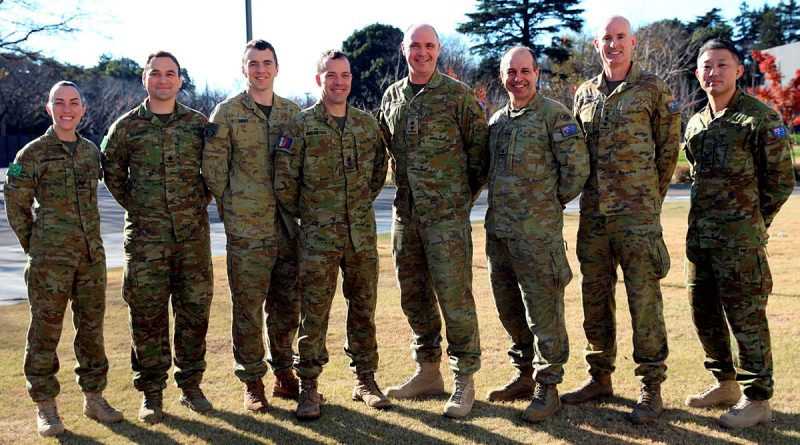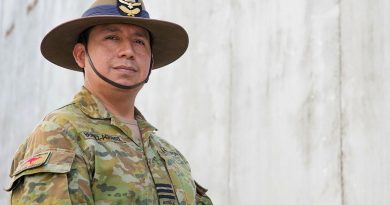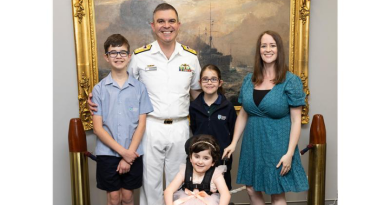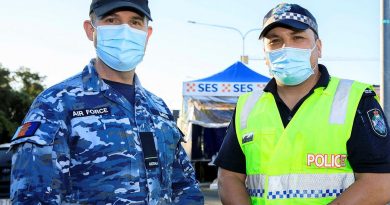Linguists vital to relationship-building

Army language can be difficult to understand as it is, but with Australia expanding its presence at Exercise Yama Sakura in Japan in 2023, effective communication will be vital to success.
CAPTION: Linguists deployed to Exercise Yama Sakura. From left, Corporal Stephanie Schuurmans, Major Peter Gojkovic, Major Chris Dent, Lieutenant Colonel Morgan McCarthy, Lieutenant Colonel Rob Tierney, Major John Howlett, Captain Steve Clements and Corporal Yuki Masaoka. Story and photo by Captain Jess O’Reilly.
Australian Defence Force linguists returned from Japan recently, where they deployed on Exercise Yama Sakura 83 to support Australian observers embedded with the US Army Pacific I Corps to observe and learn about the roles played by American and Japanese linguists.
For Major Peter Gojkovic, from Headquarters 1st Division, the chance to put his Japanese language skills to use was a welcome opportunity to return to a culture close to his heart.
“Having visited Japan as a tourist, I liked the country, the people and the culture,” Major Gojkovic said.
“It’s a beautiful country, with a mentality and culture which matches my own personality – being conscientious and having attention to detail – which I quite like.
“My role during Yama Sakura was part of the ground component command observer group. Our aim was to observe the Japan Ground Self-Defense Force’s operations, mainly to take lessons back to Australia for our future participation in the exercise with a focus on ways that we can better integrate with our Japanese partner.
“I’m a Japanese linguist, so I can facilitate Japanese discussions more naturally through translation.
“I wouldn’t call myself fluent, in the sense that I don’t have the ability to have a full technical work conversation, so I lean on other linguists to support the more detailed discussions. But because I can introduce myself and start the conversation, it creates a better relationship with our counterparts.”
To fuse together his love for Japan with his military career, Major Gojkovic took opportunities offered by the ADF.
“In 2019, I spent the year in Tokyo as part of a posting that allowed me to study advanced Japanese. Before that I studied at the Australian Defence Force School of Languages, so by the end of 2019 I was feeling very confident in my skills,” he said.
“Although it’s not an active linguist role, being involved with planning for Exercise Yama Sakura 85 next year is really good because I’ll be using my language skills constantly.”
For Army aviation pilot Captain Steve Clements, a similar attraction to life in Japan motivated him to hold onto the language skills he developed before enlisting in 2009.
“When I graduated from university I went to Japan for a bit of a break,” he said.
“I stayed for four or five years and learned Japanese during that time. Then I went back to Australia and joined the Army.
“Currently I’m an instructor at the School of Army Aviation in the MRH wing. Things were wrapping up at the end of the year so it was good timing that allowed me to be released to join Exercise Yama Sakura as a linguist.”
In an observer role rather than being involved with interpreting or translating, Captain Clements is eager to bring what he has learned back to Australia.
“We’ve been looking at how the US do it and how the Japanese do it,” he said.
“I think it’s important that we be pretty smart about how we do the language component of the exercise in 2023 and I’ve already got ideas about how we can potentially structure training programs throughout the year to set people up for success.”
Learning another language is a skill, but like any skill, it needs to be maintained.
“It can be pretty hard to balance the maintenance of your language skills with your day job, and your day job is the priority,” Captain Clements said.
“Getting a release for intensive courses or other refresher training takes coordination, but there are mutual benefits.
“Having an ability to communicate and build personal relationships, and strengthen the relationship between Australia and Japan is personally satisfying, so that’s motivating in itself.”
.
.

.
.





